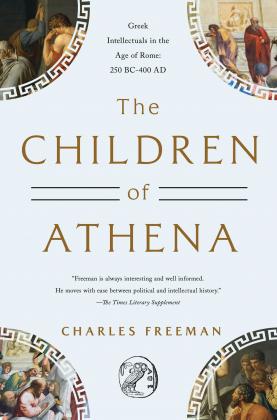
| Format | Hardcover |
| Publication Date | 12/05/23 |
| ISBN | 9781639365159 |
| Trim Size / Pages | 6 x 9 in / 400 |
A brilliant, fascinating portrait of the intellectual tradition of Greek writers and thinkers during the Age of Rome.
In 146 BC, Greece yielded to the military might of the Roman Republic; sixty years later, when Athens and other Greek city-states rebelled against Rome, the Roman general Lucius Cornelius Sulla destroyed the city of Socrates and Plato, laying waste to the famous Academy where Aristotle had studied. However, the traditions of Greek cultural life continued to flourish during the centuries of Roman rule that followed—in the lives and work of a distinguished array of philosophers, doctors, scientists, geographers, and theologians.
Charles Freeman's accounts of such luminaries as the physician Galen, the geographer Ptolemy, and the philosopher Plotinus are interwoven with contextual "interludes" that showcase a sequence of unjustly neglected and richly influential lives. A cultural history on an epic scale, The Children of Athena presents the story of a rich and vibrant tradition of Greek intellectual inquiry across a period of more than five hundred years, from the second century BC to the start of the fifth century AD.
Charles Freeman is an expert on the ancient world and its legacy. He has worked on archaeological digs on the continents surrounding the Mediterranean. Freeman is the author of numerous books over the past decades, including The Closing of the Western Mind and A New History of Early Christianity. He lives in Britain.
Buy it now in print:
Buy it now in ebook:
"It’s difficult to imagine classical philosophy without Plato and Aristotle. But as Charles Freeman writes in his engrossing new book, it’s a minor miracle their works, which date from the fourth century BC, survived the devastating decline of the Roman Empire and were even available to form the foundation of the Western philosophical tradition. [The Children of Athena] adds to an impressive series on an important era in intellectual history." Commonweal
"Children of Athena is an absorbing romp through Greek (and Roman) history, full of learning and interest, which is just what the book's manifold subjects deserve." The Critic
"Charles Freeman’s The Children of Athena is an ambitious and readable attempt to persuade you to have a go at some Epictetus, Lucian or Arrian. Mr. Freeman’s book can be seen as a splendidly old-fashioned project: an attempt to recover the Classical tradition as it might have appeared to Ficino, Erasmus or Montaigne before 19th-century taste decreed that only 'early' Greek texts were worth reading. The Children of Athena offers a kaleidoscopic survey of Greek intellectual life across five centuries. Mr. Freeman has filled a real gap. Although there have been excellent scholarly books on Greek literature and thought under the Roman empire, I know of no other survey of intellectual life in the imperial Greek world accessible to the nonspecialist reader."
The Wall Street Journal
"An enjoyable, very readable book that refreshes our knowledge of those twenty important Greek thinkers but also reminds us that empires can reap a rich reward from tolerance and respect of older traditions." Classics for All (UK)
"Historian Freeman offers an enlightening survey of the Greek intellectual tradition during the Roman Empire. It adds up to a lively series of character portraits that shed light on the history of ideas." Publishers Weekly
"A study of the significance of a neglected epoch in Greek cultural history. This book satisfyingly fulfills its promise of highlighting intellectual landmarks and hidden continuities. Well-informed, rewarding analysis of an unjustly overlooked period and its intellectual legacy." Kirkus Reviews
"This is a much-needed book. The astounding brilliance of Greek writers of the Classical period, the fifth and fourth centuries BCE, is well known. But Greek learning did not end with the end of the Classical period. Freeman demonstrates the extraordinary richness and the variety of the work being done by the Greek intellectuals of the Roman empire. Chapters are devoted to sketches of the most important writers, their environments, and their work. We meet orators, philosophers, historians, geographers, astronomers, a travel writer, a medical botanist, physicians, a satirist, polymaths with various interests, and Christian scholars. Gradually a picture emerges of the magnificence—and the lasting importance—of work being done by the Greek intellectuals of the Roman empire." Robin Waterfield, author of Plato of Athens: A Life in Philosophy
"Charles Freeman's latest effusion of cultural history is a paean of tributes to ancient Hellenic intellection. Freeman sportingly and illuminatingly engages with a wide variety of styles of thought and expression, from epideictic oratory and satire—via historiography and mathematics—to philosophy proper. Sophisticated Greek culture did not only take firm hold of the Greeks' Roman conquerors' imaginations: thanks to Byzantium and the Renaissance, it engages us still to this day.” Paul Cartledge, author of Thebes: The Forgotten City of Ancient Greece
"Too often we ask what the Romans did for us—but this important and beautifully written book reminds us to ask what the Greeks did for the Romans—and for us in turn! This is a banquet of delightful insight, important ideas and colorful characters.”
Michael Scott, Professor of Classics, University of Warwick, author of Ancient Worlds: An Epic History of East and West
"This book brings together a gallery of fascinating personalities, a group of Greek intellectuals—controversialists, scientists, and scholars—to elucidate the role they each played in the discourse and intellectual life of the Roman Empire and beyond. The varied contribution of these famous individuals places them, without doubt, in the center of Roman intellectual life and explains the long-lasting influence they have had on European literature, science, and scholarship. Freeman brings them to life so they can resonate amongst us and show off the height of their achievements once more. A much needed reminder of the wonders of late antiquity and the birth of European scholarship.” Christos Nifadopoulos, PhD, Cambridge University